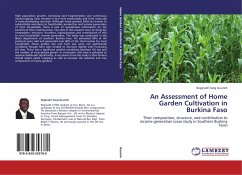High population growth, increasing land fragmentation and continuous monocropping have resulted in low farm productivity and food insecurity in many developing countries. Although home gardens (HGs) are known to substantially contribute to food/fodder production and income generation of farm households, there is lack of quantitative information on the benefits of HGs in Burkina Faso. The aims of this research were to study the composition, structure, functions, inputs/outputs and contribution of HGs to rural households income generation. The study was conducted in the Bieha department of southern Burkina Faso. An estimated 50% of HG products were sold and generated over 60% of the total income for most households. Home garden size and farm size were not significantly correlated though farm sizes tended to decrease slightly with increasing HG sizes. There was a significant positive correlation between HG size and the number of crop species grown. In conclusion, HGs have a potential to improve livelihoods significantly. A key lesson from this study is that farmers should adopt mixed cropping as well as increase the livestock and tree components of home gardens.
Bitte wählen Sie Ihr Anliegen aus.
Rechnungen
Retourenschein anfordern
Bestellstatus
Storno

